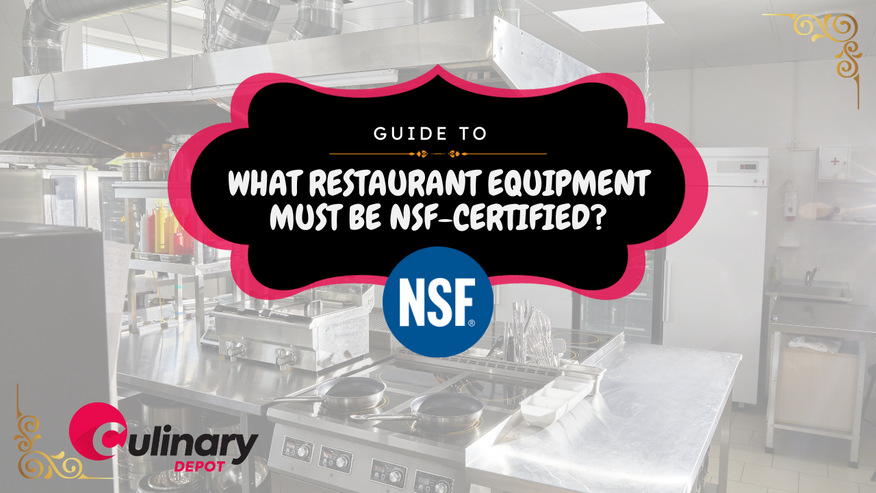Sep 28th 2023 - Team Member
What restaurant equipment must be NSF-certified?
In the fast-paced world of commercial kitchens, safety and sanitation are paramount. One crucial aspect of ensuring the safety and quality of your kitchen equipment is NSF certification. NSF International, formerly known as the National Sanitation Foundation, sets standards and provides certification for various products, including restaurant equipment. In this comprehensive guide, we will explore the importance of NSF certification and outline which restaurant equipment must bear this certification to meet industry standards.
Understanding NSF Certification
What Is NSF Certification?

Overview
- NSF certification is a mark of quality and safety assurance for products used in commercial kitchens.
- NSF International is a respected third-party organization that tests and certifies products to ensure they meet industry standards.
Importance
- NSF certification indicates that a product complies with strict criteria related to material safety, design, and performance.
- It provides peace of mind to restaurant owners and operators, assuring them that their equipment meets sanitation and safety requirements.
The NSF Certification Mark
Recognizing NSF-Certified Products
- Look for the NSF certification mark on equipment, which signifies that it has met NSF's rigorous standards.
- The mark may vary but often includes the letters "NSF" with additional information specific to the product.
Equipment Requiring NSF Certification
Food Preparation Equipment
Examples
- Food Processors: Food processors used in commercial kitchens must be NSF certified to ensure materials are safe for contact with food.
- Mixers: NSF certification is crucial for mixers to prevent contamination and ensure they are easy to clean.
Refrigeration and Freezing Equipment
Examples
- Commercial Refrigerators and Freezers: These must meet NSF standards to maintain safe food storage temperatures and prevent foodborne illness.
- Ice Machines: NSF certification ensures ice machines produce safe and clean ice for consumption.
Cooking Equipment
Examples
- Ranges and Ovens: NSF certification is essential for ranges and ovens, as they come into direct contact with food.
- Fryers: Commercial fryers must be NSF-certified to prevent oil contamination and ensure safety during operation.
Dishwashing Equipment
Examples
- Dishwashers: NSF certification for dishwashers ensures thorough cleaning and sanitizing of dishes and utensils.
- Glass Washers: Glasswashers used in bars and restaurants should also bear NSF certification.
Foodservice Sinks and Faucets
Examples
- Prep and Handwashing Sinks: NSF-certified sinks are essential for safe food preparation and handwashing.
- Faucets: Faucets should meet NSF standards to prevent lead and other contaminants from entering the water supply.
Benefits of NSF Certification
Advantages
Assurance of Safety
- NSF-certified equipment reduces the risk of foodborne illnesses and contamination.
- It demonstrates a commitment to food safety, protecting both customers and your business's reputation.
Compliance with Health Codes
- Many health departments require NSF certification for specific equipment.
- Compliance with these codes is crucial for obtaining and maintaining licenses.
Durability and Performance
- NSF certification often correlates with high-quality materials and design, resulting in equipment that performs well and lasts longer.
Conclusion
NSF certification plays a pivotal role in the commercial kitchen industry by ensuring that restaurant equipment meets strict sanitation and safety standards. Whether you're considering purchasing new equipment or verifying the certification of existing ones, knowing which equipment requires NSF certification is essential for the smooth and safe operation of your restaurant.
By choosing NSF-certified equipment, you not only meet regulatory requirements but also demonstrate your dedication to food safety and the well-being of your customers. It's a vital investment that contributes to the success and reputation of your establishment.
Related Article:

